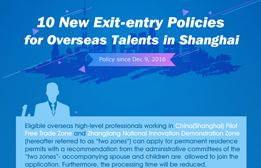Shanghai relaxes hukou rules to attract more talent
Shanghai will relax its household registration permit regulations from July by granting the permits, or hukou, to non-locals who've graduated from the world's top 50 universities and work in the city, without requirements on the amount of social security paid beforehand.
According to the policy issued by the Shanghai Human Resources and Social Security Bureau on June 1, the short-listed candidates, unlike regular candidates, will not be required to earn points based on conditions such as the amount of time they've made social security payments in the city. Instead, they can obtain the hukou for immediate settlement.
The hukou is essential for city residents in China as it grants access to children's education, health insurance and the ability to purchase property.
The move is aimed at expanding the talent pool in Shanghai to aid the resumption of business operations and production after the latest wave of COVID-19, according to the bureau.
In addition, new graduates from the world's top 100 universities can qualify for a hukou if they pay social insurance in the city for six months and have full-time jobs in the city.
Authorities will take their reference from the world university rankings of Times Higher Education, US News & World Report, Quacquarelli Symonds World University Rankings, and Shanghai Ranking's Academic Ranking of World Universities, according to the policy.
The city will offer rental reductions or exemptions, subsidies and loans, and other preferential treatment for graduates from international universities who start their own business in Shanghai.
The bureau said it will also hold innovation and entrepreneurship competitions for those graduating from universities overseas this year to promote exchanges and business collaborations.
"Shanghai has continued to loosen its restrictions over its hukou to lure talent in recent years, as many domestic cities, including Zhejiang province's Hangzhou and Hubei province's Wuhan, have offered competitive incentives," said Ren Yuan, a professor from the School of Social Development and Public Policy at Fudan University.
"The more open population policy will be beneficial for improving the city's competitive capacity and supporting its high-quality development."
In 2020, a preferential hukou policy was released in Shanghai for all new graduates who hold a bachelor's degree from four top universities: Fudan University, Shanghai Jiao Tong University, East China Normal University and Tongji University.
These graduates only need to meet basic requirements, like being employed by an eligible company that can assist them in the household registration process, instead of earning points based on academic achievements and experience.
The policy came after a pilot program was launched in Shanghai in 2018 to allow undergraduates from Peking and Tsinghua universities to get a hukou if they secure a job in the city upon graduation, instead of going through the standard process for hukou registrations.
The talent regulations were further eased last year with postgraduates from all local universities able to apply for a Shanghai hukou if they work in the city's five suburban areas: Jiading, Qingpu, Songjiang, Fengxian and Nanhui, and the Lin-gang Special Area of the China (Shanghai) Pilot Free Trade Zone.

 Print
Print Mail
Mail




